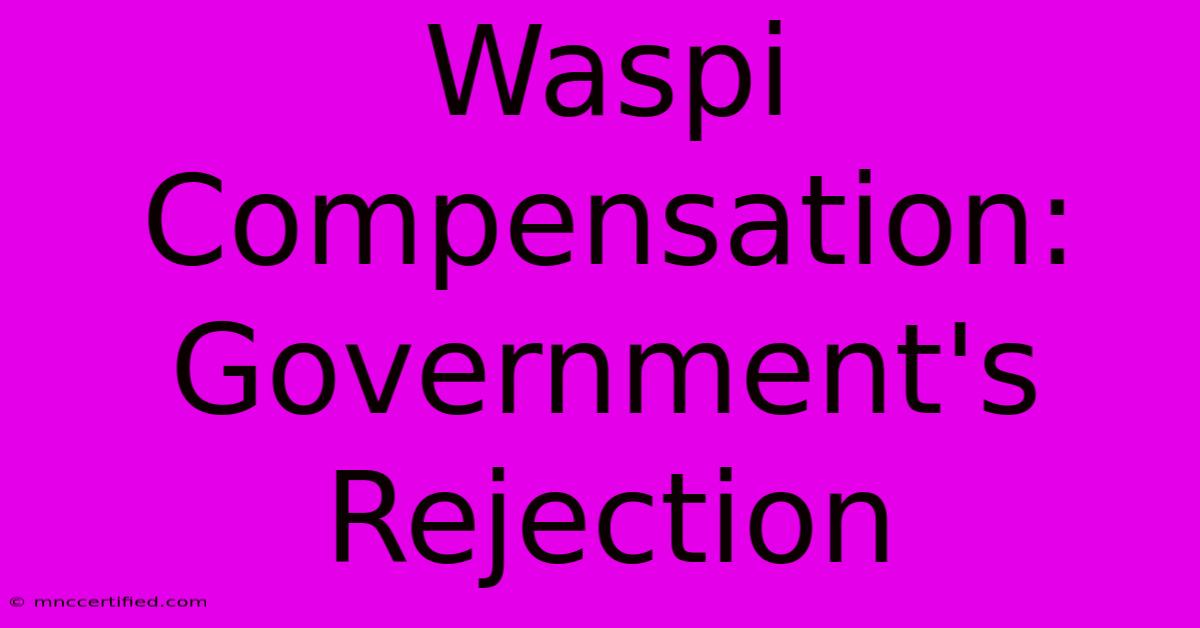Waspi Compensation: Government's Rejection

Table of Contents
Waspi Compensation: Government's Rejection and the Ongoing Fight for Justice
The fight for Waspi (Women Against State Pension Inequality) compensation continues, despite the government's rejection of a substantial payout. This article delves into the reasons behind the government's decision, explores the arguments put forward by Waspi, and examines the ongoing legal and political battles surrounding this complex issue.
Understanding the Waspi Issue: A Timeline of Injustice
The Waspi campaign centers around the changes made to the state pension age for women born in the 1950s. These changes, implemented over several years, saw the state pension age increase for women, often with little or no prior warning. Many women found themselves facing significant financial hardship due to the unexpected delay in receiving their pension, impacting their retirement plans and overall financial security.
This wasn't simply a matter of adjusting to a new retirement age; many women argued they were inadequately informed about the changes, leading to feelings of betrayal and anger. The lack of sufficient notice, coupled with the substantial financial impact, fueled the Waspi movement, which has fought tirelessly for recognition and compensation.
Key Dates and Developments:
- 1995: The Pensions Act introduces changes to the state pension age for women, gradually aligning it with men's.
- 2000s: Further legislative changes solidify the shift in pension ages.
- 2010s: The Waspi campaign gains momentum, organizing protests and legal challenges.
- 2020s: Continued legal battles and ongoing pressure on the government for compensation.
The Government's Rejection: Why No Compensation?
The government has consistently rejected calls for full Waspi compensation, citing several key arguments:
- Legality of the Changes: The government maintains that the changes to the state pension age were lawful and carried out according to parliamentary procedures. They argue that adequate notice was given, although the sufficiency of this notice remains a central point of contention.
- Financial Implications: The cost of compensating all affected women would be substantial, potentially placing a significant strain on public finances. The government has highlighted the need for responsible financial management.
- Equalization of Pension Ages: The government emphasizes that the changes were necessary to ensure equality between men and women in relation to state pension age. This was a long-term goal aimed at addressing historical gender inequalities in the pension system.
The Waspi Argument: A Case for Fairness
Waspi argues that the government's position fails to account for the significant hardship faced by many women. Their core arguments include:
- Insufficient Notice: Waspi claims that the government did not provide sufficient notice of the changes, leaving many women unprepared for the significant financial consequences. They highlight the lack of proactive communication and the difficulty many faced in understanding the complex legislative changes.
- Financial Hardship: The campaign emphasizes the severe financial hardship experienced by many affected women, including increased poverty and reliance on benefits. They argue that compensation is necessary to alleviate these hardships.
- Moral Obligation: Waspi stresses the government's moral obligation to compensate those unfairly affected by the changes, emphasizing the principles of fairness and justice.
The Ongoing Battle: Legal and Political Avenues
The Waspi campaign continues to explore various avenues to pursue compensation. This includes:
- Further Legal Challenges: Ongoing legal battles are attempting to challenge the government's position on the adequacy of notice and the fairness of the changes.
- Political Pressure: The campaign continues to exert political pressure on the government, lobbying MPs and raising public awareness of the issue.
- Public Awareness: Maintaining public awareness of the Waspi issue is crucial to sustain the pressure on the government to reconsider its position.
The fight for Waspi compensation highlights the complexities of pension reform and the importance of clear communication and adequate support for those affected by significant policy changes. The outcome remains uncertain, but the campaign's tenacity underscores the determination of women to achieve justice and financial security in their retirement. The issue remains a significant political and social concern, demanding continued attention and discussion.

Thank you for visiting our website wich cover about Waspi Compensation: Government's Rejection. We hope the information provided has been useful to you. Feel free to contact us if you have any questions or need further assistance. See you next time and dont miss to bookmark.
Featured Posts
-
Helen Rollasons Remarkable Life
Dec 18, 2024
-
Mudryk Positive Drug Test Confirmed
Dec 18, 2024
-
Connolly Defeats Aoc In Democratic Primary
Dec 18, 2024
-
Sir Name Stamp Collection Released
Dec 18, 2024
-
Time Heals Andrew Ridgeley Remembers George Michael
Dec 18, 2024